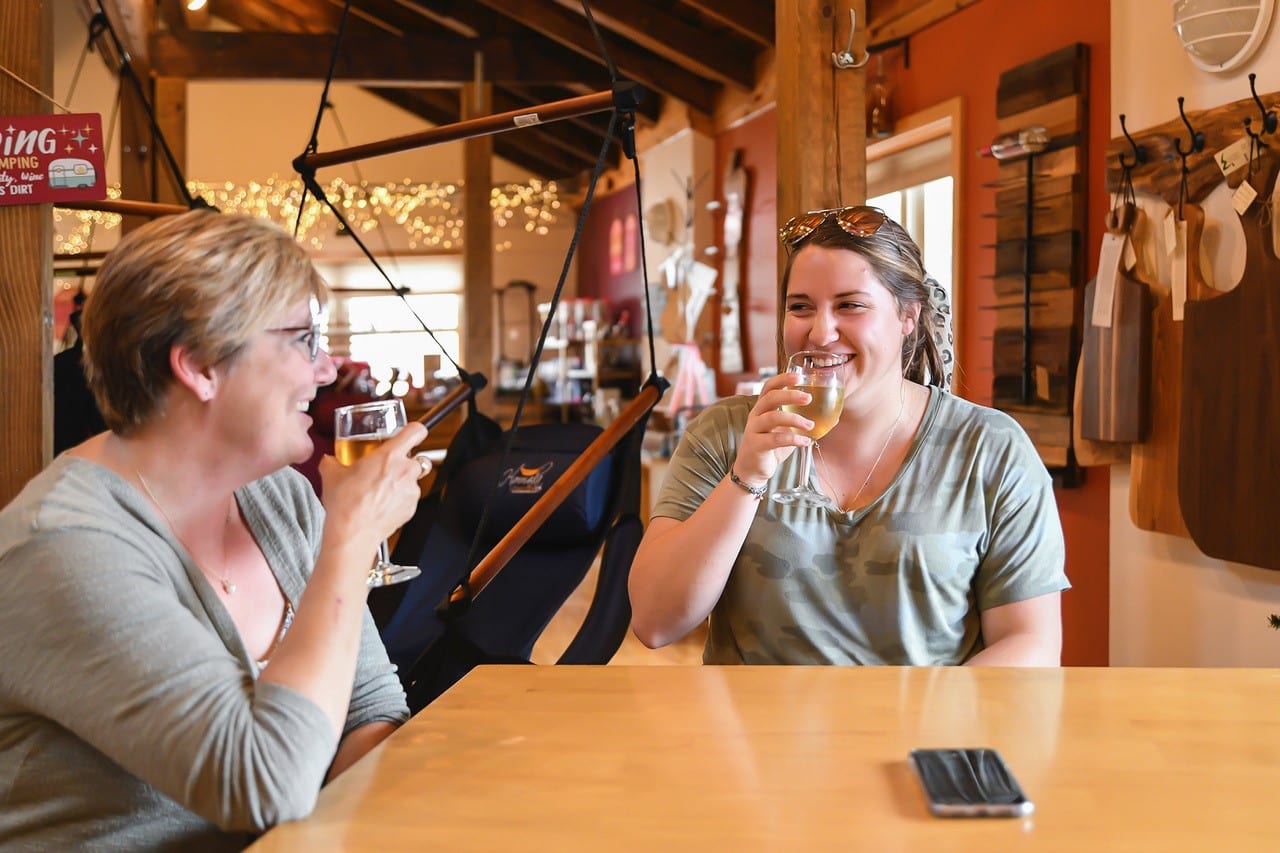
Wisconsin Main Street hosted its first Downtown Pitch Contest in June, inviting entrepreneurs from more than 100 Main Street and Connect Communities districts to share ideas for business concepts or expansions to meet the needs of local customers, enhance their district, and support and sustain local businesses.
The contest received numerous applications from each region of the state, encompassing communities large and small and businesses of all types. From an experiential Jackson Pollock-style art studio in Kenosha to a customizable donut shop in Monroe, the creativity and persistence of entrepreneurs from around the state was impressive.
After sharing their concepts and answering questions from a panel of judges, three finalists were selected from each region to move on to the state finals.
Profiles of each of these finalist businesses can be found in the Wisconsin Main Street Facebook feed.
Finalists in the regional competition embodied three common traits; a customer-centric mindset, carrying forward the tradition of Wisconsin makers, and a community-based approach to growth and measuring success.
Here are some of their stories in their own words—the inspirations, paths and processes that went into making their visions successful. We salute these individuals and all entrepreneurs who are making a difference in their downtowns, and hope that these stories inspire other innovators to take the next step toward fulfilling their dreams.
Customer-centric mindset
Many of our finalists impressed the judges with their deep understanding of local customer needs and the ability to create or adapt their business models to meet these needs.
For example, Sunset Point Winery, one of our state semi-finalists, added a private event space and secondary outdoor patio with a walk-up window, accommodating growing demand for outdoor space and private gatherings.
Another example is the startup of Foundation Nutrition & Fitness’s meal plan delivery system, which provides locally sourced, nutritious meals to rural residents of southwest Wisconsin. And Ashland’s new Copper Pasty restaurant provided a twist on a historic food in the state, offering both unique filling options and mail order delivery for Wisconsin expats missing the flavors of home.
Here, in their own words, they share their success stories.
Kelly Guay, Sunset Point Winery, Stevens Point

“Funds from winning will allow us to open a secondary tasting room to host small private events as well as a walk-up window to serve patio customers. The need for these services became evident during the pandemic, and we’ll be able to complete both projects by the end of July, essentially a six-month turnaround from concept to reality.
“The foot traffic provided by our downtown location is critical to our business. One thing we learned during the process is the need to understand the building and fire codes or hire someone who does. Avoid putting in an elevator if you can. They are nice to have, but very expensive to install and maintain. Also, for those businesses starting out: Buy your space, rather than renting, if you can.
“Collaboration to attract people to downtown is a big effort. Diversity in offerings for retail, business, entertainment, food/beverage and living space is critical for a vibrant downtown.”
Taylor Thuli and Kelli Ritchie, Foundation Fitness & Nutrition, Darlington
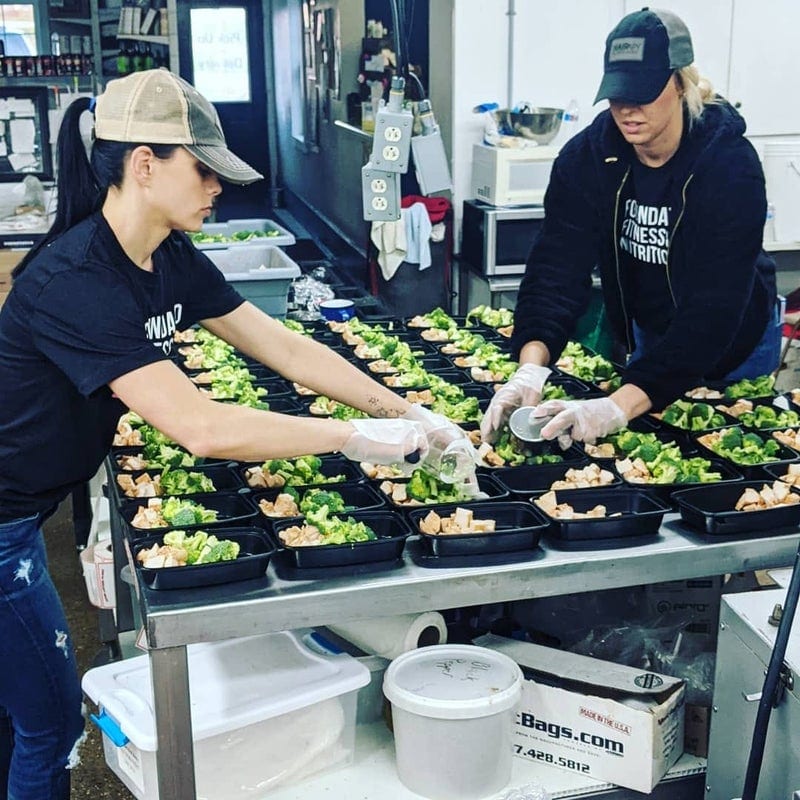
“At Foundation Fitness & Nutrition, we prepare over 1,200 meals every Sunday for over 20 different rural communities. Our meals are nutritious, fresh and filling. We currently offer a pickup and delivery service in four cities in the region.
“Our business had an accidental start. Meal prep was something we did every weekend for ourselves and family members. When people began asking us for guidance, we thought we’d make extra on the weekends to sell to people. Our ‘extra’ quickly ended up being over 1,200 meals in 12 weeks.
“We are using the grant funds to move into a permanent home in downtown Darlington. A downtown location appeals to us because it is the heart of the community. We want to see our customers each day, provide daily options and make our mission a reality: nutritious, convenient meals for everyone.
“Looking back, we wish we would have known how quickly our business would take off. We found an untapped market for a service we were able to provide. It would have benefited us to be more prepared and fully understand all aspects of running a business.
“Because of our rapid growth, we didn’t have time to connect with community partners or reach out to individuals for help. We appreciate those who approached us with assistance, as all help was welcome.
“Moving forward, we are using the opportunity presented by our transition into a permanent space to design and invest into our Main Street building so it will remain functional for our business for years to come.”
Victoria Peters, Copper Pasty, Ashland
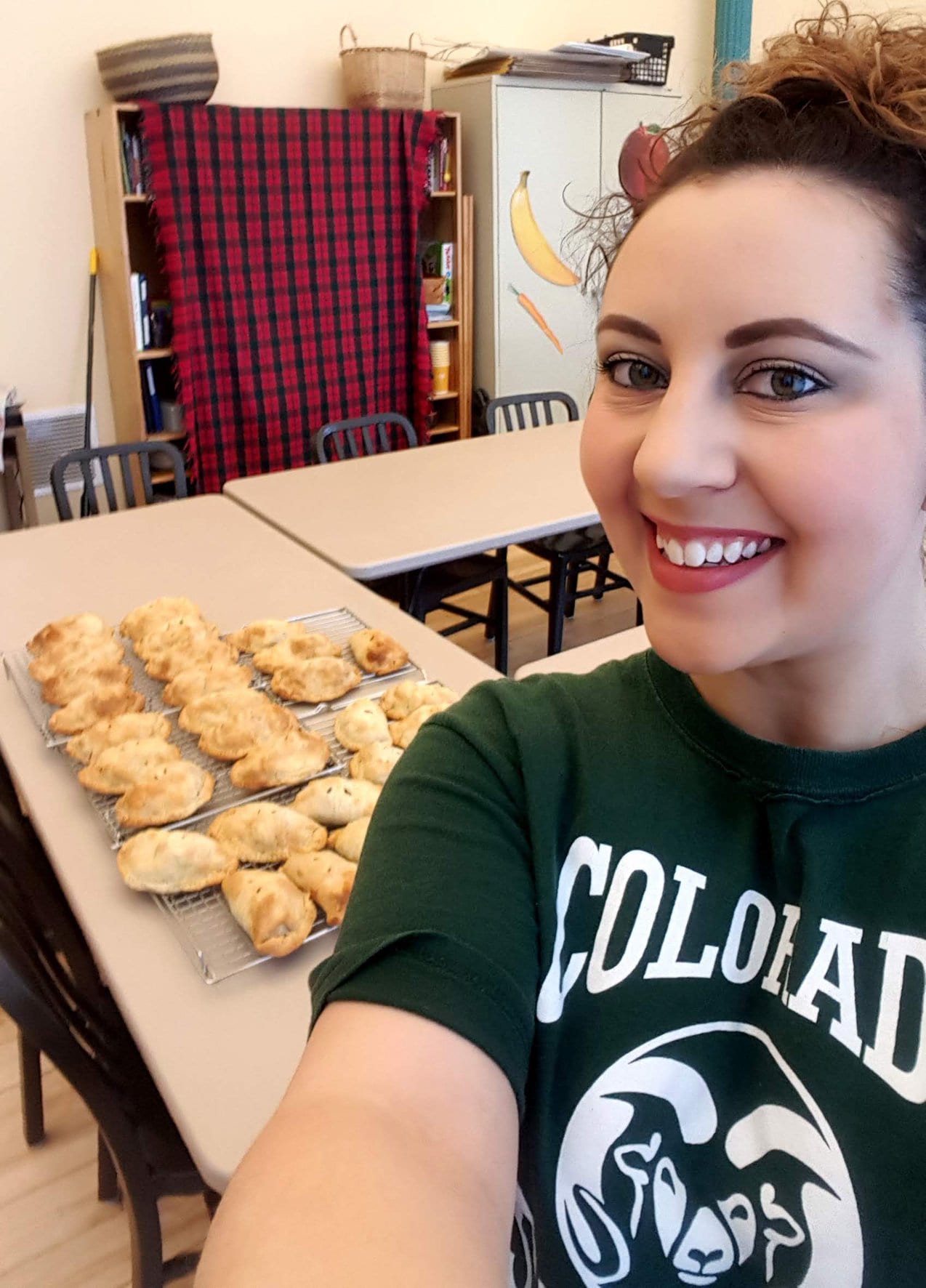
“Copper Pasty is a restaurant specializing in Cornish pasties with a twist. I make this traditional food using local Wisconsin ingredients.
“I started making pasties when my husband and I moved to the Seattle area, where I played with my recipe for several years, developing unique varieties and sharing them with a few friends.
“I got serious with it as a business concept after tasting the product at some local restaurants and realizing that my product was unique, and maybe there could be a much larger market for it than I had realized.
“We started selling pasties at the local farmers markets on the weekends in 2015, eventually branching out into direct to customer sales. After six years and a return to the Midwest, I am now getting ready for the next big stage, which is launching my brick-and-mortar pasty shop in downtown Ashland in late 2021.
“Having a pasty shop downtown was a really big decision for my business. I spent a lot of time scouting the area and other vacant restaurant spaces available in neighboring towns. However, downtown Ashland had the most potential because of the density of small businesses bringing in foot traffic, yet it lacked food options.
“As a result, although it is taking a complete renovation of an old retail shop to make this happen, I truly believe that this location will be the best option for my business. In addition, the building owners that I am leasing from really wanted to rent their space to someone who could provide some economic development to the area, and so it’s a great partnership.
“Although I am not in my physical location yet, the advice I would give is to talk with the existing businesses in the area where you’re interested in opening. They may have resources, be willing to be mentors and just have general useful information about the area that can help you with your business plan.
“Having these connections can also help you get through some of the hurdles you might encounter, such as financial and legal issues. I have found that existing business owners are usually very receptive to helping someone who is just getting off the ground, even if they have a similar business.”
Community-based business model

We often hear that downtowns are appealing business locations because they provide not only a built-in source of foot traffic, but also a supportive business environment filled with like-minded business owners willing and able to partner together to market to customers, host events or just generate good ideas.
Several of our finalists took this it-takes-a-village mindset to the next level, building their business plans focused on partnerships with other local businesses.
For instance, grand prize winner Chef Pam’s Kitchen is taking the opportunity presented by a new, larger facility to open a retail space showcasing the products produced by its kitchen incubator tenants.
Meanwhile, Wings of Fire Consulting and the Phoenix Wellness Center will expand the amenities available to growing wellness businesses, helping them reach new customers and collaborate.
Across the state, the Wisconsin Milk House will feature education, sales and marketing for Wisconsin’s local dairy businesses, while the Coloma Mercantile Space combines several women entrepreneurs to create a home for multiple growing businesses while filling a long-vacant space in its small downtown district.
Pam Dennis, Chef Pam’s Kitchen, Waukesha
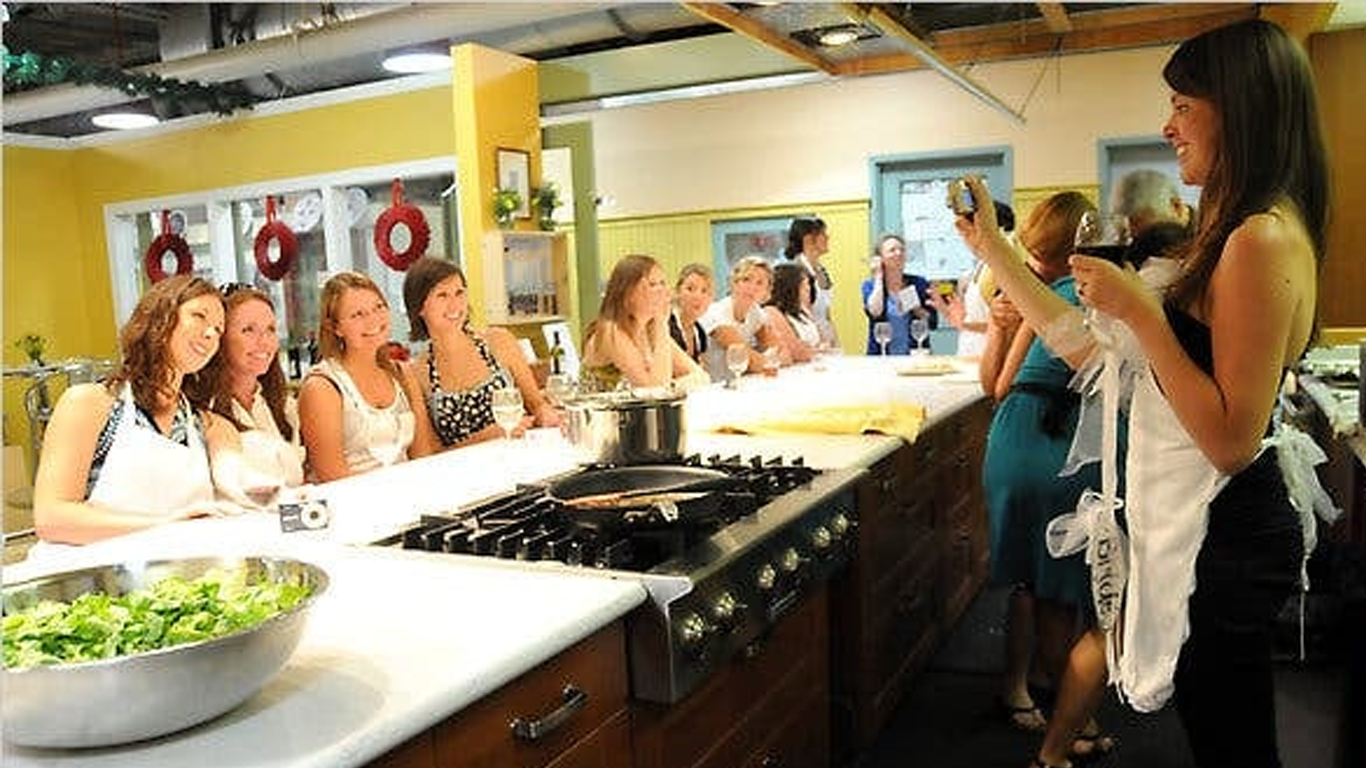
“Chef Pam’s Kitchen provides a dining experience that is unique to Wisconsin. We are not just a demonstration cooking school, but rather, our guests prepare everything themselves, from the appetizer to the main dish as well as the dessert. We are fanatical at providing an amazing customer experience, whether you’ve cooked for many years or have just begun.
“We recently expanded into a larger space and use almost a third of our square footage for artisans to rent one of our four commercial kitchens. They prepare their food for distribution to farmers markets, grocery stores, and online sales. Our next phase of the project will be to create a marketplace inside our space where they would be able to sell their products and essentially have a mini-storefront on a busy Main Street in downtown Waukesha without having to risk or invest in a physical store presence on their own.
“I always knew I wanted to do this, but it quickly became a reality when I was walking Main Street with a fellow culinary colleague and we saw a storefront for rent that was just listed that day. It had an Albanian flag inside and my dad immigrated here from Albania—so that was a sign that this must be the spot to launch my business. We signed the lease soon afterward and thus began my dream.
“We were fortunate to have some pretty quick success, making a profit in year one and doubling sales the following year despite the pandemic. Our commercial kitchen was just a single station, so artisans would have to work around my classes when they wanted to book time. This challenge, along with a sold-out class schedule, propelled me to look for a larger space. A property next door had been vacant since 2013. In working with our management company, we were able to negotiate a deal for that property that allowed us to complete an almost fivefold expansion.
“I could not see my business anywhere else than where it is today. The downtown vibe is amazing. I never mind cleaning the fingerprints from the windows as people look in to see what the space is all about. I also love the downtown business community, which is incredibly supportive. There is a genuine interest to help each other succeed, and the collaborative business exchange is priceless.
“If I could go back, I would have thought bigger in a cautious and calculated way by visualizing what things would look like two or three years down the road, and possibly expanded into a larger space sooner. Many said we were nuts to expand during the pandemic. But we saw it as an opportunity to negotiate a much lower lease than we ever could have during a non-pandemic year, while gaining the additional space that helped us scale the business and take advantage of operational efficiencies.
“My advice to an entrepreneur looking to take the next step is to know your business inside and out, and really draw a line on what you stand for and differentiate yourself—whether through amazing experiences or the product you sell. And don’t underestimate the importance of community partners. The city community development staff here works closely with all the downtown business groups and owners. This support was instrumental in communicating the numerous grants and opportunities that are available to the downtown businesses. If you are not familiar with your community advocates, I would recommend taking some time to get to know them.”
Kristina Watanabe, Wings of Fire Consulting and the Phoenix Wellness Center, Racine
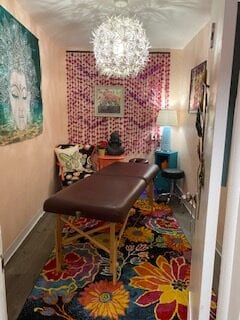
“Wings of Fire Consulting and the Phoenix Wellness Center is a cooperative, co-working wellness center. I offer practitioner rooms that are decorated and ready to use for massage, Reiki, acupuncture, coaching and more. Practitioners may rent for as little time as one hour or full-time as needed to start, run or grow their wellness business. This model was developed as a response to watching so many wellness businesses close during the pandemic. I also offer coaching and marketing support for my tenants, helping them build their brand. The business also serves customers, letting clients book services from any practitioner in a single group calendar. Wellness clients can even book multiple services from multiple practitioners and receive services all under one roof. The shared space also allows us to offer public workshops and classes ranging from CPR to sound baths and vision board bookmaking.
“I began my business in 2017 as a mobile wellness offering. I used other people’s spaces as my temporary home for events. I have pivoted my model a few times over the years, finally landing on a brick-and-mortar space in downtown Racine.
“I knew during the pandemic that people were going to need to heal. I believed creating a space that offered support for the wellness community was the best place for me to focus my efforts. I love downtown Racine. There are so many interesting shops and restaurants. There is a collective effort to make our city an exciting place to be. Critically, it also allows my business to serve and be accessible to a large customer base.
“Moving into a physical space is hard. Everything always costs more than you imagine. There will be delays. There will be compromises. You need to have a support system to keep you going. Otherwise, you will get lost in the process.
“I was fortunate to have a good working knowledge of the processes I needed to complete with the city. Someone new to Racine or opening a new business here may miss things like proper permitting and inspection or occupancy permits. It’s a lot to navigate. There’s even more if you were to sell food or alcohol. You may need to speak to multiple departments.
“There are so many great community partners like WEDC, the U.S. Small Business Administration, Downtown Racine Corporation, WWBIC and so many others. It took time for me to learn about all these organizations and what they have to offer. They are all great at referrals, but sometimes people don’t know where to start. It would be awesome to have that information centralized to help direct a business toward the first or next steps. I have been very fortunate to work with many of these organizations. The tools they offer are so important to being successful. Similarly, communities could offer a new business packet that had all the important information needed for common permitting and licensing questions. I think that could be very helpful.”
Lisa Erickson, Wisconsin Milk House, Osceola
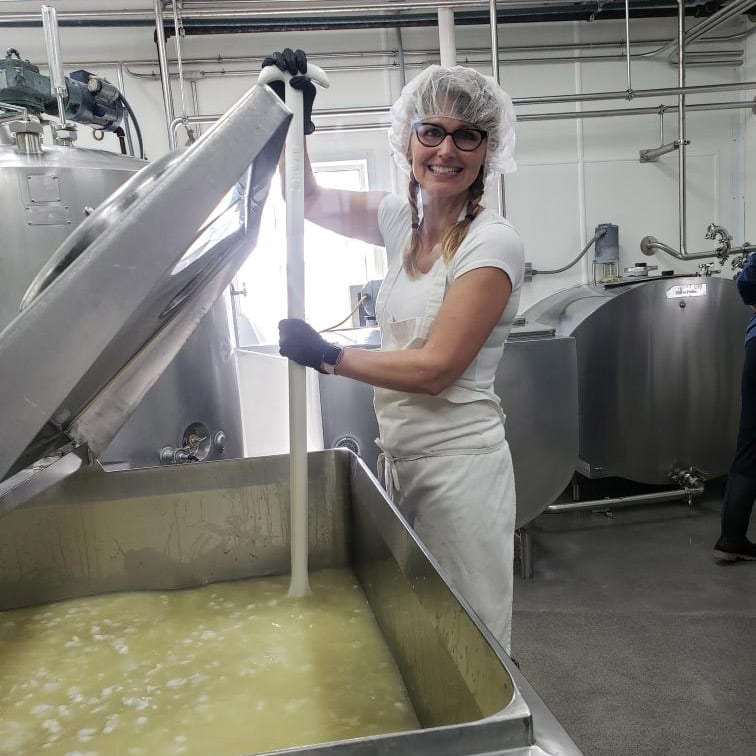
“Wisconsin leads the world in awards when it comes to dairy and cheese, and I saw this huge gap on my side of the state to create a space where our dairy farmers and the industry are recognized. The space will not only feature a shop with award-winning cheese and dairy goods, but also serve as a place that teaches consumers about the farming process, the history of dairy farming, and the uniqueness of dairy in Wisconsin.
“In the store, we have historical displays, photos of dairy farming from the 1930s and 1940s, retail goods from around the state, a seven-foot-wide windmill from a local farm and a full-on grilled cheese deli and dairy bakery. My shop is a place to get the best dairy products and learn something about our great state.
“I love everything about dairy. In the summer of 2015, I got into a friendly argument about cheese with my best friend from Switzerland. We were arguing about who had the best cheese in the world. A few months later, a Wisconsin cheesemaker won the World Cheese Championship. That argument turned into a book about Wisconsin cheese. During the research for the book and my time spent as a regent for the University of Wisconsin System, I fell more in love with the Wisconsin dairy industry. I met farmers, cheesemakers, processors, cheese judges and inspectors. Wisconsin stood out not only as a leader, but as the best. To an individual, those in the industry were passionate and kind—something I wanted to be part of.
“I had been thinking about opening my own shop since I first understood that I could. My dad was a fabulous cook and we spent hours in the kitchen together. My sister and I would create menus and set up a pretend restaurant in the living room, and our parents were customers. I have been in the food industry for most of my life. I owned a catering business, managed a ski resort event center, hosted a cooking segment on TV and wrote a food column for almost 12 years. My dream of opening my own shop has morphed over the last five years. My dream was always to open a gourmet pizza and brew pub. But about five years ago, I realized that concept wasn’t niche enough. My expanded concept included a European-style gourmet cheese shop that sold pizza, too.
“Finding the perfect location for my business concept proved to be difficult, with several potential locations falling through. In the meantime, I ended up accepting a position as a dairy plant manager and learned everything I could about dairy, ultimately receiving my cheesemaker’s license.
“Then, the onset of the pandemic amid many other changes made me realize that life is too short to not pursue your dreams. I resigned on a Monday with no plans—only my dream. The very next day, a key property in our downtown went up for sale. I looked at it on Wednesday, made an offer and it was accepted on Thursday. It’s all about being ready and in the right place, at the right time with the right people and having the right idea. Osceola is developing into a destination, and I hope my business will complement the already great businesses downtown.
“Three things are crucial for me. First, let your idea brew and develop over time. Research the heck out of it. After writing a book about cheese and dairy in Wisconsin over two years, I realized I had all this data and information that was incredibly valuable. Not only did I research from a laptop, I traveled the world comparing Wisconsin cheese to cheeses from France, Switzerland, Italy and Spain. I talked to everyone I could find. Second, make lots of friends that you can ask questions of or seek advice from. Most things you can’t do on your own. My friends have been my lifeline. When I say friends, these are industry friends who are experts in other aspects for me such as branding managers, chamber directors, grocery store owners, food scientists, writers and more. Build out your support network. Third—location, location, location. Wait for the right place—even if it takes years.
“Small business owners need information that is beneficial in a quick and easy form. Sometimes we need hand-holding and a phone call to help us understand something or for guidance. Access is the most important thing, and I appreciate how quickly our community partners find answers for me. If there was one thing that would make it easier, I would say having someone to call and get answers quickly is the most helpful resource for small businesses. I’m lucky in that our town has an outstanding chamber of commerce director who works hard to make sure businesses have access to vital information. The Wisconsin Main Street Program has been incredibly beneficial to Osceola, and opportunities like this really showcase the value of being a Main Street community. I chose to open my shop downtown on Main Street because of the vibrant mix of businesses already there.”
Sue Apps, Mercantile Business Incubator, Coloma
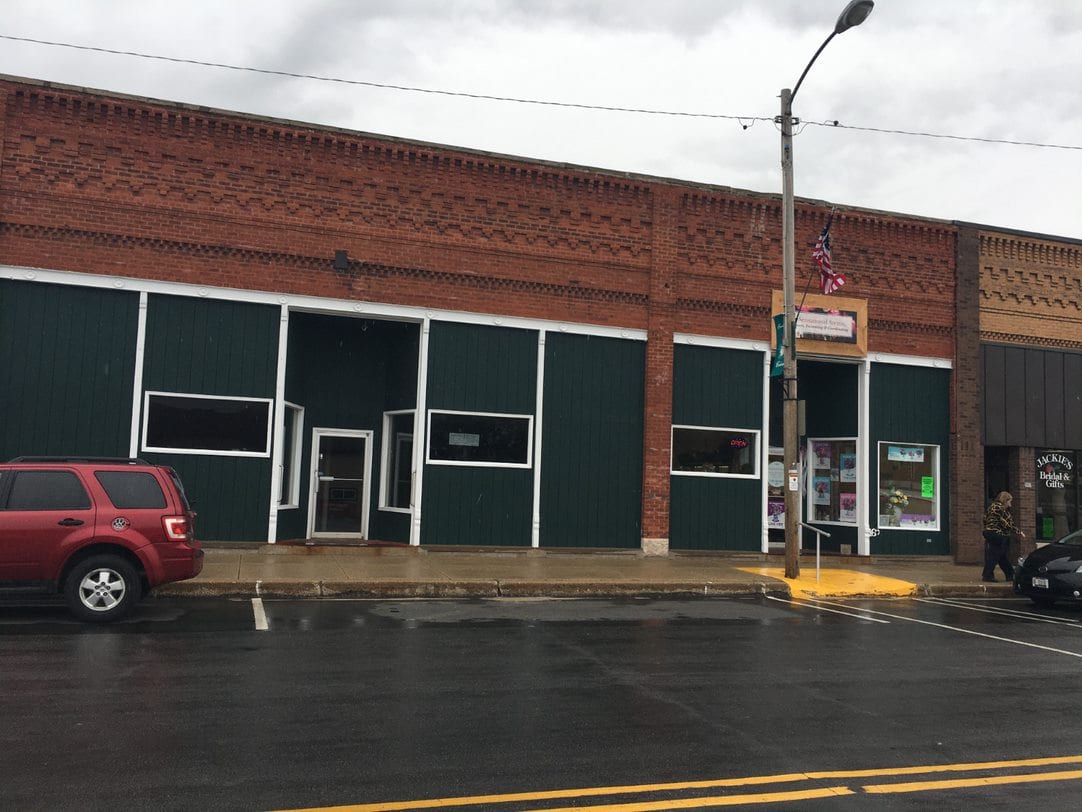
“We are planning to renovate an old building in the center of Coloma’s downtown. This building was purchased with the intention to renovate the space and incubate three or more new businesses. One business, a florist, was able to move into the space, while the remainder of the building needs total renovation to accommodate the remaining two interested businesses: A new chocolatier and a yoga studio.
“The project had originally been conceived as a village initiative, but COVID-19 kept the relevant committee from hosting planned fundraisers, resulting in limited activity. After we were able to purchase the property, the project could move forward more rapidly. We have successfully remodeled three other buildings in the village, and this property sits prominently at the top of the T intersection. Left vacant, it would negatively impact the rest of downtown.
“The project is significant given the size of the property and amount of renovations needed, but having one existing tenant and two other committed businesses make it more feasible—and also exciting as business advocates, since the impact in our small community will be substantial. The biggest hurdles are always building code questions. It’s not always easy to get all the answers you need in advance, so we are hopeful that our plan submittal to the state office goes smoothly.
“Even after several successful projects, we are learning and making connections as we go. For those considering undertaking a project in their community, lots of people say, ‘Someone should do something about that,’ but they don’t want to take the risk. Sometimes you just have to be the one to step forward. We are hoping that this will pay off and that Coloma will continue to grow and become a place for entrepreneurs to find their dreams. Having local partners and officials ready and willing to support people willing to take those risks is important for making this type of project happen.”
Makers in Wisconsin

Wisconsin is known for its strong manufacturing heritage, which includes not just corporate manufacturing but also local makers.
Several of our entrepreneurs illustrated this heritage, turning their engineering and design knowhow into full-time business enterprises.
While Midwest Woodturners focused on creating functional art and training community members in techniques for creating their own custom pieces, across the state Sheboatin’ developed a scalable approach to allow a popular pastime—pedal (or paddle) pubs—to operate in rural communities as well as urban environments.
Chad Stevenson, Midwest Woodturners, Ellsworth
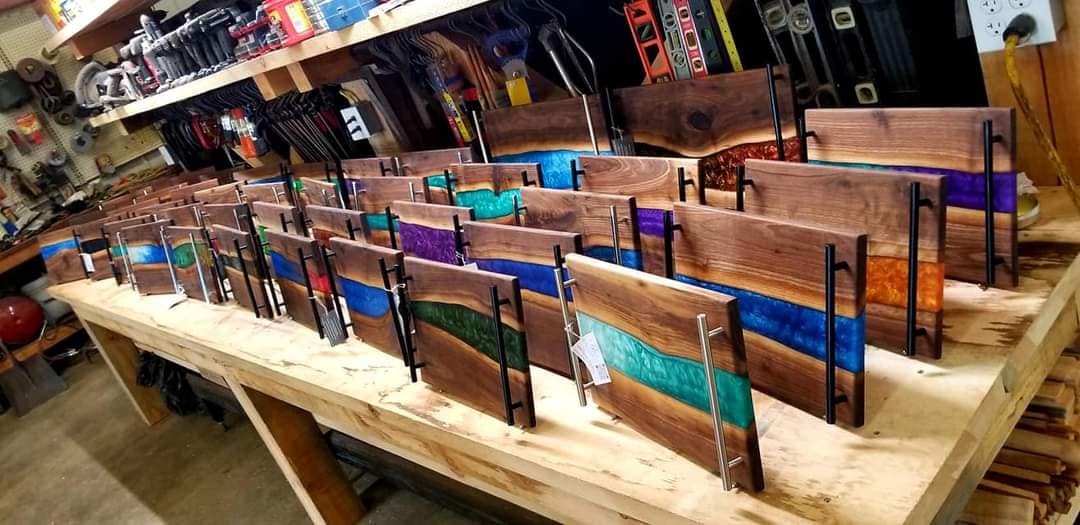
“Midwest Woodturners focuses on creating functional art for the home, using wood and epoxy to create one-of-a-kind pieces.
“While I knew from age 13 that I had to be a professional woodworker and artist, the business has evolved over time from craft shows and direct-to-customer sales to our ever-growing epoxy seminars and classes. The business has outgrown our three-car garage space and needs a space suitable for a showroom and classroom facility to accommodate our growth.
“For other businesses wrestling with when and how to expand or scale: Make sure you really understand your balance sheet and how acquiring more space or equipment can increase your efficiencies or alter your cash flow. What might seem like a big investment could pay off in operational improvements if managed appropriately.
“Don’t forget to promote other local brands and businesses. Share your success by helping others grow their market, too. It is humbling to know that your business can help other businesses grow and vice versa.”
Justin Vannieuwenhoven, Sheboatin’, Elkhart Lake
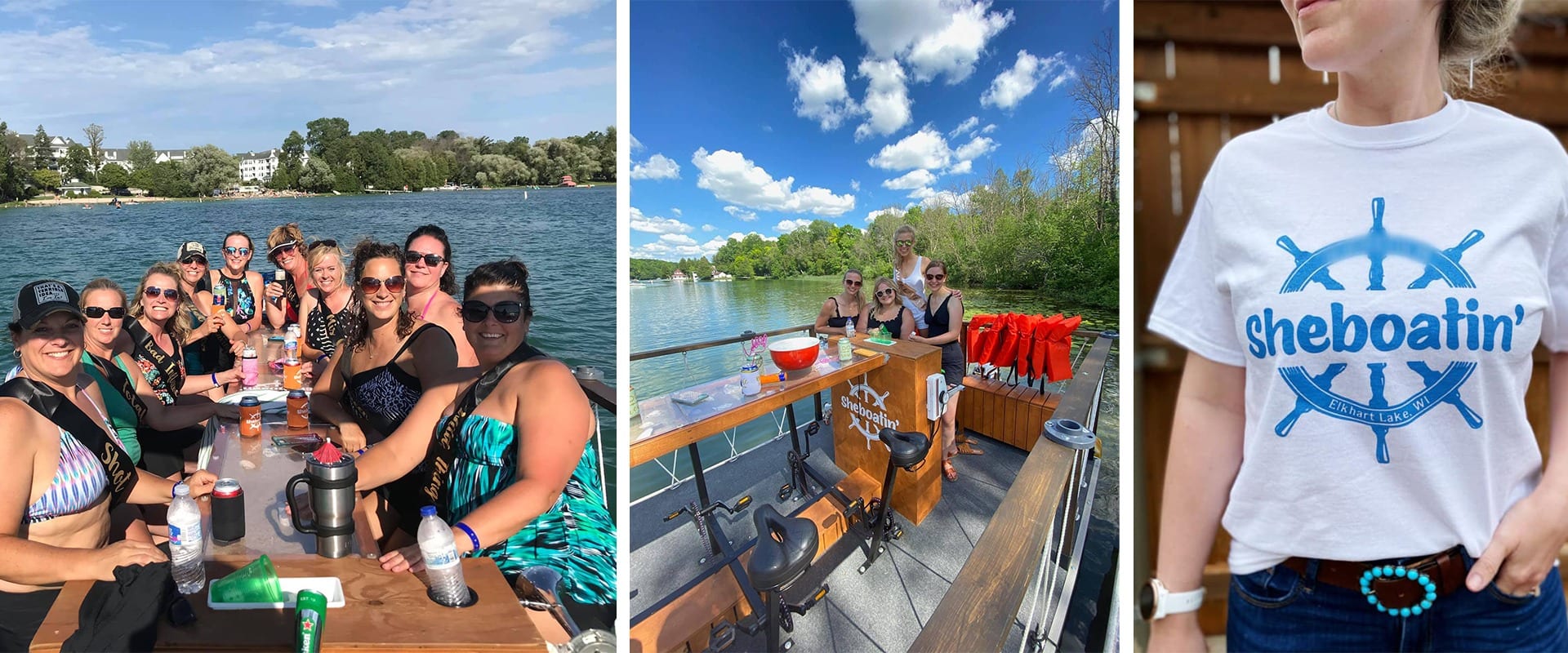
“Sheboatin’ is an innovative 10-person pedal tavern boat that provides a unique boating experience that combines a boat ride, a carnival, a house party and an arcade all wrapped into one.
“After running a successful pedal pub business where many customers requested a paddle-pub concept, we researched, developed and launched our first boat within 12 months. We chose Elkhart Lake as our home port since it is a stunning crystal-clear lake that is like no other place in the area.
“Looking back, I wish I would have been able to meet more people and make more contacts in the area. This would have allowed me to more smoothly transition the brand and reduce the learning curve for educating local residents about our offerings.”
